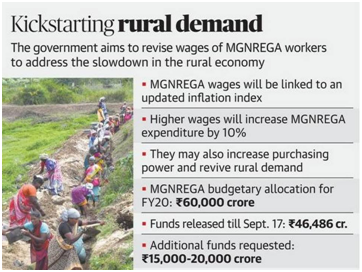

The central government plans to link Mahatma Gandhi National Rural Employment Guarantee Act (MGNREGA) scheme by linking wages under the Act to an updated inflation index.
Context
The central government plans to link Mahatma Gandhi National Rural Employment Guarantee Act (MGNREGA) scheme by linking wages under the Act to an updated inflation index.
About
- It is believed that MGNREGA wages have increased the cash flow in rural economy and has led to rural inflation.
- The national average wage of an MGNREGA worker is ?178.44 per day, less than half of the ?375 per day minimum wage recommended by a Labour Ministry panel in 2018.

- The central government also plans to increase wages, thus increasing purchasing power and reviving rural demand as there is slowdown in the general economy.
- The Ministry of Statistics and Programme Implementation and the Labour Bureau are updating the consumer price indices for rural areas (CPI-R) and agricultural labourers (CPI-AL) and MGNREGA wages will be added to it.
- This is one of the demand-side interventions that the government is carrying out in light of the current scenario in the rural economy
- As MGNREGA workers get paid much lower than market rates some economists question whether linking wage rates to a better inflation index will be enough to revive the economy.
Background
- MGNREGA gives legal guarantee of wage employment to the adult members of rural households who are willing to do unskilled manual labour subject to a maximum of 100 days per household
- Every rural household has the right to register under MGNREGA
- Job cards issued to every household registered under MGNREGA
- Job cards issued within 15 days from the date of receipt of application for the job card registration
- The registered job card holders can seek employment by giving a group / individual application
- The village community has the right to choose works under 8 permissible categories of works
- The works proposed by the village community cannot be altered by anyone unless they are not in conformity with the guidelines of MGNREGA
- Equal payment for men and women
- Wages to be paid within a fortnight
- 1/3 beneficiaries should be women
- Work site facilities such as creche, drinking water and shade have to be provided
- No contractors and machinery allowed
- Social Audit is a must for all the works implemented under NREGA.
- Provisions of RTI Act are applicable to ensure transparency and accountability in MGNREGA scheme
- The office of the Ombudsman is vested with powers to redress grievances under MGNREGA
Advantages served by MGNREGA
- MGNREGA has helped dent poverty, reduced distress migration and raised the bargaining power of rural labourers, especially among lower castes and women, the biggest beneficiaries of the programme.
- A study by the National Council of Applied Economic Research (NCAER)found that the MGNREGS has reduced poverty overall by up to 32% and has prevented 14 million people from falling into poverty.
- MGNREGS is effectively a conditional cash-transfer programme. The condition is that the beneficiary has to work manually which immediately rules out the rich and the middle class. Therefore it is an important scheme that achieves inclusive development.
Issues with MGNREGA
- This populist scheme helped raise wages without raising productivity. MGNREGA has contributed more to inflation than to rural wealth. The money wasted such could have been used in constructing roads, bridges or schools in villages.
- Lack of adequate financial allocation, pending liabilities and low wages have dogged the programme over years. About 20% of the Budget allocation in each of the last five years is of pending wage liabilities from previous years. This is a possible challenge for reviving the rural economy in real sense.


